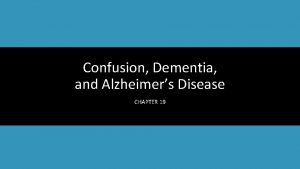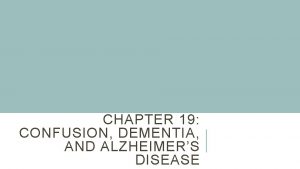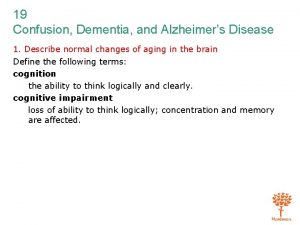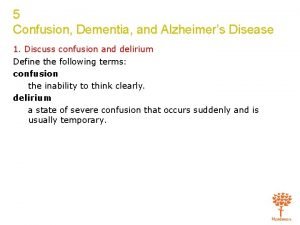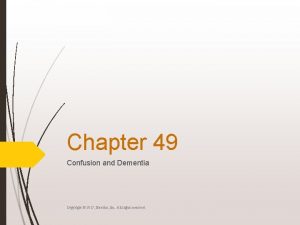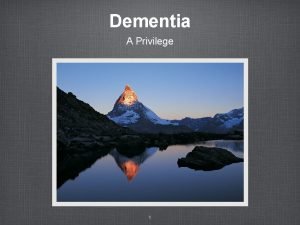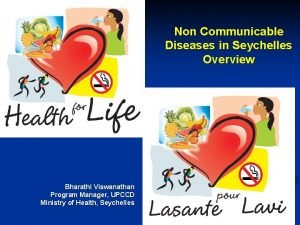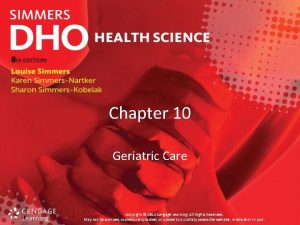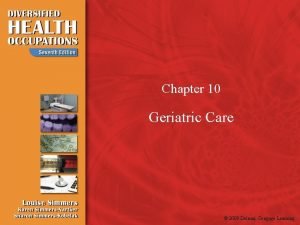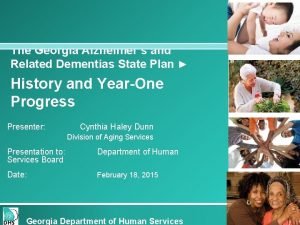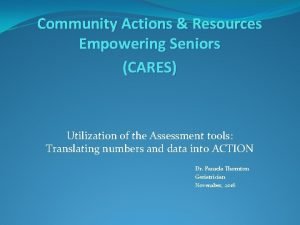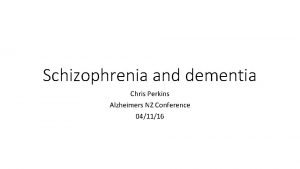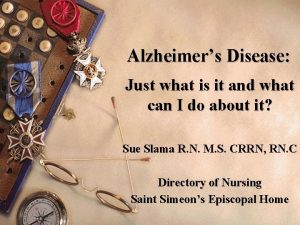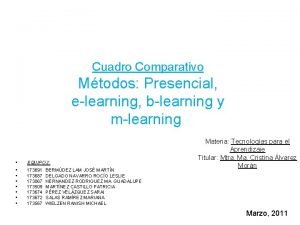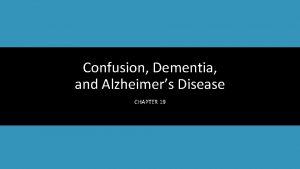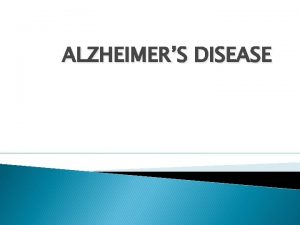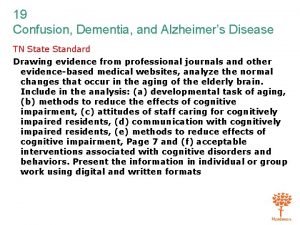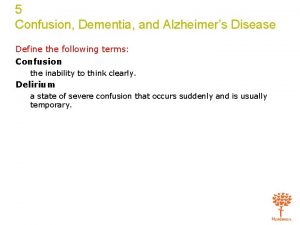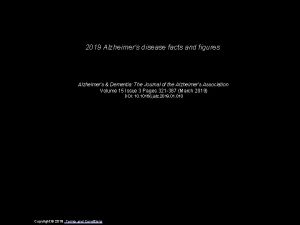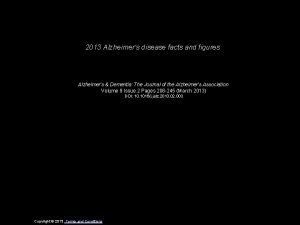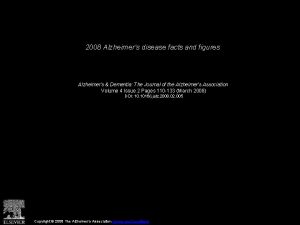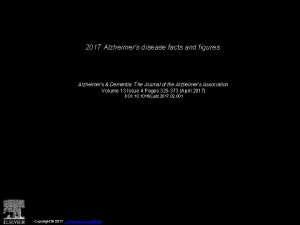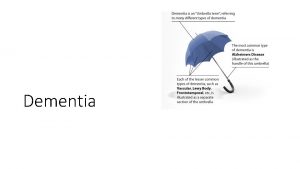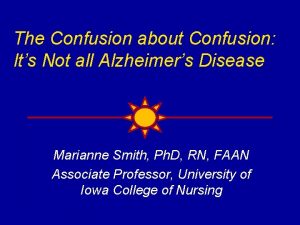CHAPTER 19 CONFUSION DEMENTIA AND ALZHEIMERS DISEASE LEARNING















- Slides: 15

CHAPTER 19: CONFUSION, DEMENTIA, AND ALZHEIMER’S DISEASE

LEARNING OBJECTIVES Describe normal changes of aging in the brain Discuss confusion and delirium Describe dementia including related terms Describe Alzheimer’s disease and identify its stages Identify personal attitudes helpful in caring for residents with Alzheimer’s disease List strategies for better communication with residents with Alzheimer’s disease Explain general principles that will help assist residents with personal care Describe interventions for problems with common activities of daily living (ADLs) Describe interventions for common difficult behaviors related to Alzheimer’s disease Describe creative therapies for residents with Alzheimer’s disease Discuss how Alzheimer’s disease may affect the family Identify community resources available to people with Alzheimer’s disease and their families

NORMAL CHANGES OF THE AGING BRAIN Important points about the aging brain

CONFUSION AND DELIRIUM Confusion Delirium Points to remember about confusion Possible causes of confusion Care guidelines Causes Symptoms

DEMENTIA AND RELATED TERMS Dementia Causes

ALZHEIMER’S DISEASE (AD) AND ITS STAGES Alzheimer’s Disease Facts about Alzheimer’s Disease Stages of Alzheimer’s Disease

ATTITUDES HELPFUL IN CARING FOR RESIDENTS WITH ALZHEIMER’S DISEASE Helpful attitudes for working with AD Residents

STRATEGIES FOR BETTER COMMUNICATION WITH RESIDENTS WITH ALZHEIMER’S DISEASE General communication tips Interventions for a resident who: Is frightened or anxious Forgets or shows memory loss Has trouble finding words or names Seems not to understand basic instructions or questions Wants to say something but cannot Does not remember how to perform basic tasks Insists on doing something that is unsafe or not allowed Hallucinates or is paranoid or accusing Is depressed or lonely Repeatedly asks to “go home” Is verbally abusive or uses bad language Has lost most of his or her verbal skills

GENERAL PRINCIPLES THAT WILL HELP ASSIST RESIDENTS WITH PERSONAL CARE General principles when assisting AD residents

INTERVENTIONS FOR PROBLEMS WITH COMMON ACTIVITIES OF DAILY LIVING (ADLS) Bathing Grooming and dressing Toileting Nutrition Physical health Mental and emotional health

INTERVENTIONS FOR COMMON DIFFICULT BEHAVIORS RELATED TO ALZHEIMER’S DISEASE Agitation Perseveration or repetitive phrasing Sundowning Disruptiveness Catastrophic Reactions Inappropriate social behavior Violent behavior Inappropriate sexual behavior Pacing and wandering Sleep disturbances Hallucinations or delusions Pillaging and hoarding Depression

CREATIVE THERAPIES FOR RESIDENTS WITH ALZHEIMER‘S Creative therapies for residents with AD Reality orientation Validation therapy Reminiscence therapy Activity therapy

HOW ALZHEIMER’S DISEASE MAY AFFECT THE FAMILY Affects of Alzheimer’s Disease on the family

COMMUNITY RESOURCES AVAILABLE TO PEOPLE WITH ALZHEIMER’S DISEASE AND THEIR FAMILIES Resources: Alzheimer’s Association National Institute on Aging Alzheimer’s Disease Education and Referral Center Counseling Support groups Healthcare professionals

REVIEW Describe normal changes of aging in the brain Discuss confusion and delirium Describe dementia including related terms Describe Alzheimer’s disease and identify its stages Identify personal attitudes helpful in caring for residents with Alzheimer’s disease List strategies for better communication with residents with Alzheimer’s disease Explain general principles that will help assist residents with personal care Describe interventions for problems with common activities of daily living (ADLs) Describe interventions for common difficult behaviors related to Alzheimer’s disease Describe creative therapies for residents with Alzheimer’s disease Discuss how Alzheimer’s disease may affect the family Identify community resources available to people with Alzheimer’s disease and their families
 Chapter 19 confusion dementia and alzheimer's disease
Chapter 19 confusion dementia and alzheimer's disease Confusion dementia and alzheimer disease chapter 19
Confusion dementia and alzheimer disease chapter 19 A helpful way for an na to respond to hallucinations is to
A helpful way for an na to respond to hallucinations is to Confusion dementia and alzheimer's disease
Confusion dementia and alzheimer's disease Chapter 49 confusion and dementia
Chapter 49 confusion and dementia Alzheimers society contented dementia
Alzheimers society contented dementia Communicable disease and non communicable disease
Communicable disease and non communicable disease Chapter 10:1 myths on aging
Chapter 10:1 myths on aging Chapter 10:4 confusion and disorientation in the elderly
Chapter 10:4 confusion and disorientation in the elderly Georgia alzheimers planning
Georgia alzheimers planning Fast scale dementia
Fast scale dementia Alzheimers sjukdom
Alzheimers sjukdom Alzheimers nz conference 2020
Alzheimers nz conference 2020 Alzheimers society citrix
Alzheimers society citrix Alzheimers eye test joke
Alzheimers eye test joke Cuadro comparativo e-learning m-learning b-learning
Cuadro comparativo e-learning m-learning b-learning
